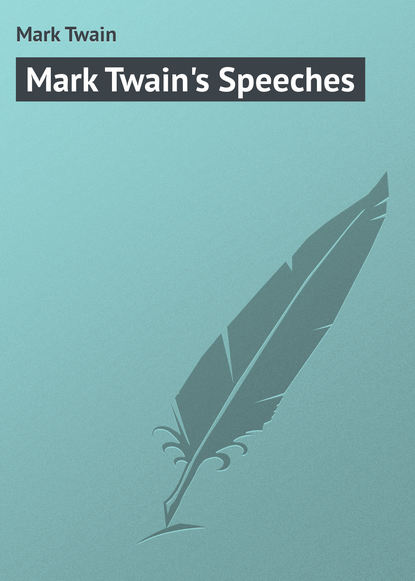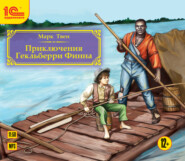По всем вопросам обращайтесь на: info@litportal.ru
(©) 2003-2025.
✖
Mark Twain's Speeches
Настройки чтения
Размер шрифта
Высота строк
Поля
Mr. Chairman and fellow-savages, – I am very glad indeed to have that portrait. I think it is the best one that I have ever had, and there have been opportunities before to get a good photograph. I have sat to photographers twenty-two times to-day. Those sittings added to those that have preceded them since I have been in Europe – if we average at that rate – must have numbered one hundred to two hundred sittings. Out of all those there ought to be some good photographs. This is the best I have had, and I am glad to have your honored names on it. I did not know Harold Frederic personally, but I have heard a great deal about him, and nothing that was not pleasant and nothing except such things as lead a man to honor another man and to love him. I consider that it is a misfortune of mine that I have never had the luck to meet him, and if any book of mine read to him in his last hours made those hours easier for him and more comfortable, I am very glad and proud of that. I call to mind such a case many years ago of an English authoress, well known in her day, who wrote such beautiful child tales, touching and lovely in every possible way. In a little biographical sketch of her I found that her last hours were spent partly in reading a book of mine, until she was no longer able to read. That has always remained in my mind, and I have always cherished it as one of the good things of my life. I had read what she had written, and had loved her for what she had done.
Stanley apparently carried a book of mine feloniously away to Africa, and I have not a doubt that it had a noble and uplifting influence there in the wilds of Africa – because on his previous journeys he never carried anything to read except Shakespeare and the Bible. I did not know of that circumstance. I did not know that he had carried a book of mine. I only noticed that when he came back he was a reformed man. I knew Stanley very well in those old days. Stanley was the first man who ever reported a lecture of mine, and that was in St. Louis. When I was down there the next time to give the same lecture I was told to give them something fresh, as they had read that in the papers. I met Stanley here when he came back from that first expedition of his which closed with the finding of Livingstone. You remember how he would break out at the meetings of the British Association, and find fault with what people said, because Stanley had notions of his own, and could not contain them. They had to come out or break him up – and so he would go round and address geographical societies. He was always on the warpath in those days, and people always had to have Stanley contradicting their geography for them and improving it. But he always came back and sat drinking beer with me in the hotel up to two in the morning, and he was then one of the most civilized human beings that ever was.
I saw in a newspaper this evening a reference to an interview which appeared in one of the papers the other day, in which the interviewer said that I characterized Mr. Birrell’s speech the other day at the Pilgrims’ Club as “bully.” Now, if you will excuse me, I never use slang to an interviewer or anybody else. That distresses me. Whatever I said about Mr. Birrell’s speech was said in English, as good English as anybody uses. If I could not describe Mr. Birrell’s delightful speech without using slang I would not describe it at all. I would close my mouth and keep it closed, much as it would discomfort me.
Now that comes of interviewing a man in the first person, which is an altogether wrong way to interview him. It is entirely wrong because none of you, I, or anybody else, could interview a man – could listen to a man talking any length of time and then go off and reproduce that talk in the first person. It can’t be done. What results is merely that the interviewer gives the substance of what is said and puts it in his own language and puts it in your mouth. It will always be either better language than you use or worse, and in my case it is always worse. I have a great respect for the English language. I am one of its supporters, its promoters, its elevators. I don’t degrade it. A slip of the tongue would be the most that you would get from me. I have always tried hard and faithfully to improve my English and never to degrade it. I always try to use the best English to describe what I think and what I feel, or what I don’t feel and what I don’t think.
I am not one of those who in expressing opinions confine themselves to facts. I don’t know anything that mars good literature so completely as too much truth. Facts contain a deal of poetry, but you can’t use too many of them without damaging your literature. I love all literature, and as long as I am a doctor of literature – I have suggested to you for twenty years I have been diligently trying to improve my own literature, and now, by virtue of the University of Oxford, I mean to doctor everybody else’s.
Now I think I ought to apologize for my clothes. At home I venture things that I am not permitted by my family to venture in foreign parts. I was instructed before I left home and ordered to refrain from white clothes in England. I meant to keep that command fair and clean, and I would have done it if I had been in the habit of obeying instructions, but I can’t invent a new process in life right away. I have not had white clothes on since I crossed the ocean until now.
In these three or four weeks I have grown so tired of gray and black that you have earned my gratitude in permitting me to come as I have. I wear white clothes in the depth of winter in my home, but I don’t go out in the streets in them. I don’t go out to attract too much attention. I like to attract some, and always I would like to be dressed so that I may be more conspicuous than anybody else.
If I had been an ancient Briton, I would not have contented myself with blue paint, but I would have bankrupted the rainbow. I so enjoy gay clothes in which women clothe themselves that it always grieves me when I go to the opera to see that, while women look like a flower-bed, the men are a few gray stumps among them in their black evening dress. These are two or three reasons why I wish to wear white clothes: When I find myself in assemblies like this, with everybody in black clothes, I know I possess something that is superior to everybody else’s. Clothes are never clean. You don’t know whether they are clean or not, because you can’t see.
Here or anywhere you must scour your head every two or three days or it is full of grit. Your clothes must collect just as much dirt as your hair. If you wear white clothes you are clean, and your cleaning bill gets so heavy that you have to take care. I am proud to say that I can wear a white suit of clothes without a blemish for three days. If you need any further instruction in the matter of clothes I shall be glad to give it to you. I hope I have convinced some of you that it is just as well to wear white clothes as any other kind. I do not want to boast. I only want to make you understand that you are not clean.
As to age, the fact that I am nearly seventy-two years old does not clearly indicate how old I am, because part of every day – it is with me as with you, you try to describe your age, and you cannot do it. Sometimes you are only fifteen; sometimes you are twenty-five. It is very seldom in a day that I am seventy-two years old. I am older now sometimes than I was when I used to rob orchards; a thing which I would not do to-day – if the orchards were watched. I am so glad to be here to-night. I am so glad to renew with the Savages that now ancient time when I first sat with a company of this club in London in 1872. That is a long time ago. But I did stay with the Savages a night in London long ago, and as I had come into a very strange land, and was with friends, as I could see, that has always remained in my mind as a peculiarly blessed evening, since it brought me into contact with men of my own kind and my own feelings.
I am glad to be here, and to see you all again, because it is very likely that I shall not see you again. It is easier than I thought to come across the Atlantic. I have been received, as you know, in the most delightfully generous way in England ever since I came here. It keeps me choked up all the time. Everybody is so generous, and they do seem to give you such a hearty welcome. Nobody in the world can appreciate it higher than I do. It did not wait till I got to London, but when I came ashore at Tilbury the stevedores on the dock raised the first welcome – a good and hearty welcome from the men who do the heavy labor in the world, and save you and me having to do it. They are the men who with their hands build empires and make them prosper. It is because of them that the others are wealthy and can live in luxury. They received me with a “Hurrah!” that went to my heart. They are the men that build civilization, and without them no civilization can be built. So I came first to the authors and creators of civilization, and I blessedly end this happy meeting with the Savages who destroy it.
General Miles And The Dog
Mr. Clemens was the guest of honor at a dinner given by the Pleiades Club at the Hotel Brevoort, December 22, 1907. The toastmaster introduced the guest of the evening with a high tribute to his place in American literature, saying that he was dear to the hearts of all Americans.
It is hard work to make a speech when you have listened to compliments from the powers in authority. A compliment is a hard text to preach to. When the chairman introduces me as a person of merit, and when he says pleasant things about me, I always feel like answering simply that what he says is true; that it is all right; that, as far as I am concerned, the things he said can stand as they are. But you always have to say something, and that is what frightens me.
I remember out in Sydney once having to respond to some complimentary toast, and my one desire was to turn in my tracks like any other worm – and run, for it. I was remembering that occasion at a later date when I had to introduce a speaker. Hoping, then, to spur his speech by putting him, in joke, on the defensive, I accused him in my introduction of everything I thought it impossible for him to have committed. When I finished there was an awful calm. I had been telling his life history by mistake.
One must keep up one’s character. Earn a character first if you can, and if you can’t, then assume one. From the code of morals I have been following and revising and revising for seventy-two years I remember one detail. All my life I have been honest – comparatively honest. I could never use money I had not made honestly – I could only lend it.
Last spring I met General Miles again, and he commented on the fact that we had known each other thirty years. He said it was strange that we had not met years before, when we had both been in Washington. At that point I changed the subject, and I changed it with art. But the facts are these:
I was then under contract for my Innocents Abroad, but did not have a cent to live on while I wrote it. So I went to Washington to do a little journalism. There I met an equally poor friend, William Davidson, who had not a single vice, unless you call it a vice in a Scot to love Scotch. Together we devised the first and original newspaper syndicate, selling two letters a week to twelve newspapers and getting $1 a letter. That $24 a week would have been enough for us – if we had not had to support the jug.
But there was a day when we felt that we must have $3 right away—$3 at once. That was how I met the General. It doesn’t matter now what we wanted so much money at one time for, but that Scot and I did occasionally want it. The Scot sent me out one day to get it. He had a great belief in Providence, that Scottish friend of mine. He said: “The Lord will provide.”
I had given up trying to find the money lying about, and was in a hotel lobby in despair, when I saw a beautiful unfriended dog. The dog saw me, too, and at once we became acquainted. Then General Miles came in, admired the dog, and asked me to price it. I priced it at $3. He offered me an opportunity to reconsider the value of the beautiful animal, but I refused to take more than Providence knew I needed. The General carried the dog to his room.
Then came in a sweet little middle-aged man, who at once began looking around the lobby.
“Did you lose a dog?” I asked. He said he had.
“I think I could find it,” I volunteered, “for a small sum.”
“‘How much?’” he asked. And I told him $3.
He urged me to accept more, but I did not wish to outdo Providence. Then I went to the General’s room and asked for the dog back. He was very angry, and wanted to know why I had sold him a dog that did not belong to me.
“That’s a singular question to ask me, sir,” I replied. “Didn’t you ask me to sell him? You started it.” And he let me have him. I gave him back his $3 and returned the dog, collect, to its owner. That second $3 I earned home to the Scot, and we enjoyed it, but the first $3, the money I got from the General, I would have had to lend.
The General seemed not to remember my part in that adventure, and I never had the heart to tell him about it.
When In Doubt, Tell The Truth
Mark Twain’s speech at the dinner of the “Freundschaft Society,” March 9, 1906, had as a basis the words of introduction used by Toastmaster Frank, who, referring to Pudd’nhead Wilson, used the phrase, “When in doubt, tell the truth.”
Mr. Chairman, Mr. Putzel, and gentlemen of the Freundschaft, – That maxim I did invent, but never expected it to be applied to me. I did say, “When you are in doubt,” but when I am in doubt myself I use more sagacity.
Mr. Grout suggested that if I have anything to say against Mr. Putzel, or any criticism of his career or his character, I am the last person to come out on account of that maxim and tell the truth. That is altogether a mistake.
I do think it is right for other people to be virtuous so that they can be happy hereafter, but if I knew every impropriety that even Mr. Putzel has committed in his life, I would not mention one of them. My judgment has been maturing for seventy years, and I have got to that point where I know better than that.
Mr. Putzel stands related to me in a very tender way (through the tax office), and it does not behoove me to say anything which could by any possibility militate against that condition of things.
Now, that word – taxes, taxes, taxes! I have heard it to-night. I have heard it all night. I wish somebody would change that subject; that is a very sore subject to me.
I was so relieved when judge Leventritt did find something that was not taxable – when he said that the commissioner could not tax your patience. And that comforted me. We’ve got so much taxation. I don’t know of a single foreign product that enters this country untaxed except the answer to prayer.
On an occasion like this the proprieties require that you merely pay compliments to the guest of the occasion, and I am merely here to pay compliments to the guest of the occasion, not to criticise him in any way, and I can say only complimentary things to him.
When I went down to the tax office some time ago, for the first time in New York, I saw Mr. Putzel sitting in the “Seat of Perjury.” I recognized him right away. I warmed to him on the spot. I didn’t know that I had ever seen him before, but just as soon as I saw him I recognized him. I had met him twenty-five years before, and at that time had achieved a knowledge of his abilities and something more than that.
I thought: “Now, this is the man whom I saw twenty-five years ago.” On that occasion I not only went free at his hands, but carried off something more than that. I hoped it would happen again.
It was twenty-five years ago when I saw a young clerk in Putnam’s bookstore. I went in there and asked for George Haven Putnam, and handed him my card, and then the young man said Mr. Putnam was busy and I couldn’t see him. Well, I had merely called in a social way, and so it didn’t matter.
I was going out when I saw a great big, fat, interesting-looking book lying there, and I took it up. It was an account of the invasion of England in the fourteenth century by the Preaching Friar, and it interested me.
I asked him the price of it, and he said four dollars.
“Well,” I said, “what discount do you allow to publishers?”
He said: “Forty percent off.”
I said: “All right, I am a publisher.”
He put down the figure, forty per cent off, on a card.
Then I said: “What discount do you allow to authors?”
He said: “Forty per cent off.”
“Well,” I said, “set me down as an author.”
“Now,” said I, “what discount do you allow to the clergy?”
He said: “Forty per cent off.”

















